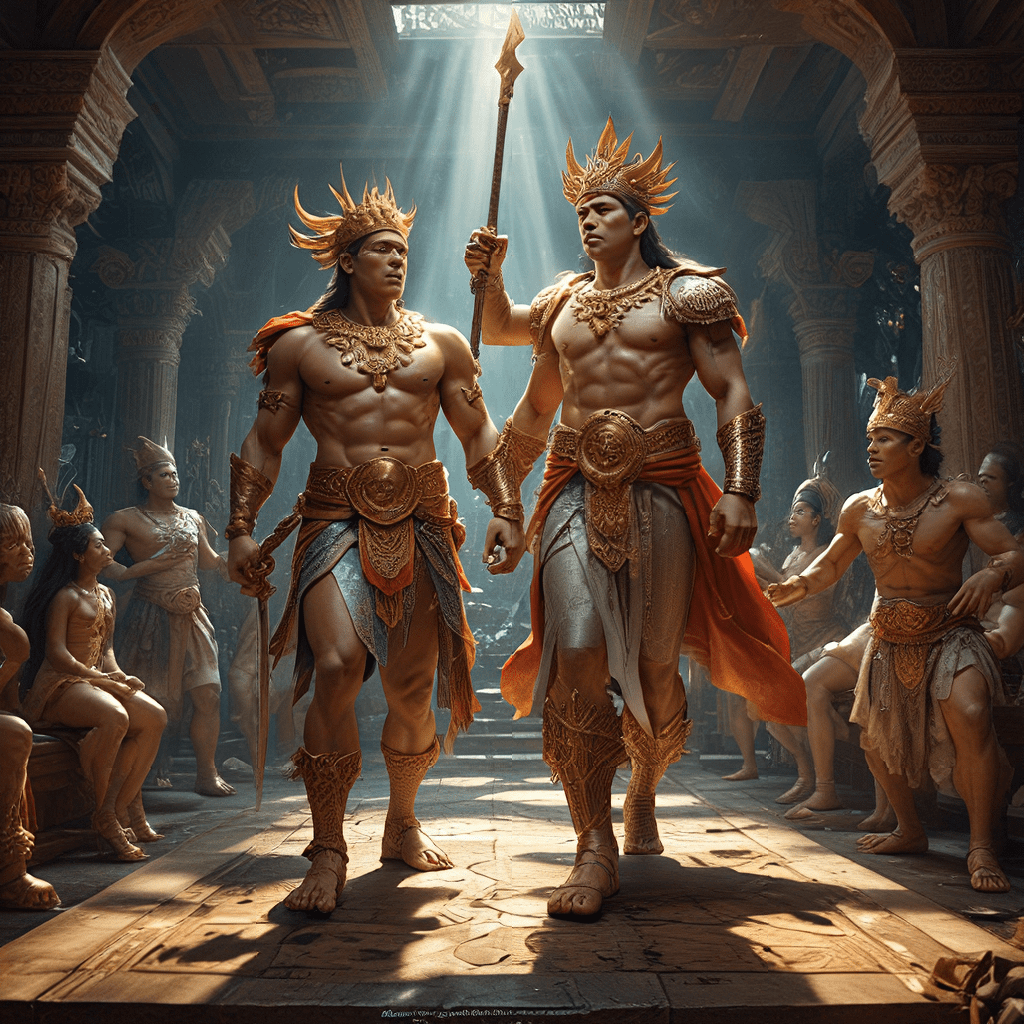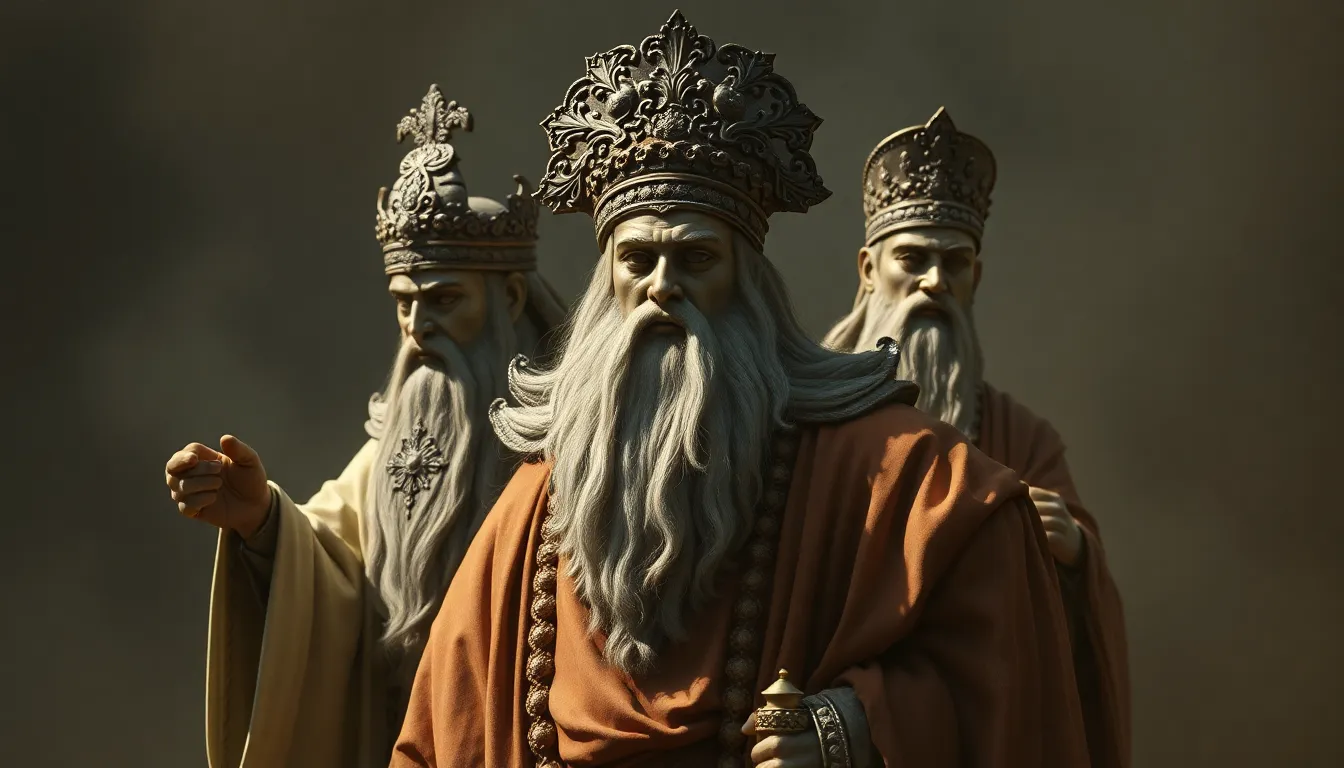Filipino Mythology: Legends of Wisdom and Knowledge
The Philippines, a nation of over 7,000 islands, boasts a rich tapestry of mythology woven through generations. These stories, passed down orally, are filled with lessons about life, nature, and the importance of knowledge. Filipino myths, often steeped in animism and shamanism, explore the interconnectedness of humanity with the natural world and the divine. They showcase the value of wisdom and the consequences of its absence.
The Filipino Pantheon: A Tapestry of Wisdom
The Filipino pantheon is a diverse assembly of deities, spirits, and mythical creatures, each embodying different aspects of life and nature. Each deity possesses unique powers, representing various forces of the natural world and human emotions. Some of the most prominent figures in Filipino mythology include:
- Bathala: The supreme creator god, responsible for the creation of the universe and all living beings. Bathala is often depicted as a wise and benevolent figure, representing order and harmony.
- Mayari: The goddess of the moon, symbolizing beauty, grace, and feminine power. Mayari is known for her wisdom and her ability to guide lost souls.
- Apolaki: The god of the sun, representing strength, power, and masculinity. Apolaki is often associated with fire and war, and he is known for his fierce protection of his people.
- Lalahon: The goddess of fertility, responsible for abundance and prosperity. Lalahon is associated with the Earth and its bounty, and she is often worshipped for her ability to bring good fortune and harvests.
These deities often interact with mortals, offering guidance, protection, and even delivering punishments for wrongdoing. They embody the ideals of wisdom, compassion, and respect for the natural world, serving as models for human behavior.
The Importance of Knowledge in Filipino Mythology
Knowledge plays a vital role in Filipino mythology, serving as a key to understanding the world and achieving success. The stories emphasize the acquisition of wisdom through observation, experience, and learning from elders. This knowledge is not just intellectual; it encompasses practical skills, social etiquette, and reverence for tradition.
In numerous myths, characters acquire special abilities, discover hidden truths, or overcome challenges thanks to their knowledge. For example, the mythical hero Bernardo Carpio, known for his incredible strength, learned to control his power and use it for good. These stories highlight the value of knowledge and its potential to empower individuals and shape the destiny of nations.
The Role of Elders and Ancestors: Keepers of Wisdom
In traditional Filipino culture, elders and ancestors are revered as the keepers of wisdom and knowledge. Younger generations are expected to learn from their elders, respecting their experience and guidance. These elders act as repositories of history, traditions, and practical knowledge passed down through generations.
The stories of legendary figures like Lam-ang, a brave warrior known for his strength and intelligence, emphasize the importance of learning from experienced elders. His adventures highlight the value of listening to wisdom and seeking guidance from those who have walked the path before.
Legends of Wise Creatures and Supernatural Beings
Filipino mythology is populated with a diverse cast of creatures, each possessing unique abilities and knowledge. Some of these creatures serve as guides and protectors of humanity, while others embody the dangers of the natural world. The stories often use these creatures to convey wisdom about nature, human behavior, and the balance of the universe.
- Tikbalang: A creature with the head of a horse and the body of a human, known for its mischievous nature and ability to lead travelers astray. The Tikbalang represents the dangers of ignorance and the consequences of straying from the path of righteousness.
- Kapre: A giant, cigar-smoking creature who resides in trees, known for its strength and wisdom. The Kapre embodies the power of nature and the importance of respecting its forces.
- Manananggal: A creature that can detach its upper torso and fly, often preying on unsuspecting victims. The Manananggal represents the dangers of greed and the importance of being wary of those who may seem harmless.
These creatures offer insights into the complexities of the natural world and the importance of respecting its power. They serve as cautionary tales, reminding humans to be mindful of their actions and to seek guidance from those who understand the balance of life.
The Power of Words and Language: Tools of Knowledge and Power
In Filipino mythology, words and language are not just tools for communication but also powerful forces that can shape reality. The stories often feature characters who possess the ability to use words to control the elements, influence the minds of others, and even create life. This emphasizes the power of language and the responsibility that comes with its usage.
Examples of this power are found in various myths:
- Alamat ng Pinya: This legend tells the story of a young woman who uses her words to create a delicious fruit, the pineapple, through her ingenuity and resourcefulness.
- The Story of the Sorcerer: This tale features a powerful sorcerer who uses incantations and spells to control the world around him. The story highlights the potential for both good and evil that lies within the power of language.
- The Importance of Storytelling: Storytellers in Filipino culture are often seen as keepers of knowledge and tradition, their words weaving together history, wisdom, and cultural values. The act of storytelling itself is considered a powerful act of knowledge transmission.
These stories underscore the idea that words can be used to heal, to create, to destroy, and to inspire. They serve as a reminder that the power of language is a double-edged sword, capable of both immense good and devastating harm.
The Search for Knowledge: Trials and Transformations
Many Filipino myths center around characters who embark on quests or trials in search of knowledge, wisdom, or magical powers. These journeys often involve overcoming obstacles, encountering supernatural beings, and undergoing transformative experiences. The quest itself symbolizes the lifelong pursuit of knowledge and the sacrifices required to achieve true wisdom.
The story of Lam-ang, for instance, illustrates this. Lam-ang, a powerful warrior, faces various challenges to prove his strength and intellect. He encounters mythical creatures, overcomes dangerous situations, and ultimately gains knowledge that empowers him to vanquish evil and protect his people.
These narratives emphasize the process of learning, growth, and the importance of perseverance in seeking knowledge. They also highlight the potential for personal transformation that comes with gaining wisdom and understanding.
Theories on the Origins of Filipino Wisdom Traditions
The origins of Filipino wisdom traditions are deeply rooted in ancestral knowledge, passed down through generations. These traditions have been shaped by various influences, including:
- Animism: The belief that spirits and deities inhabit all aspects of the natural world. This belief fosters a deep respect for nature and its power, emphasizing the importance of living in harmony with the environment.
- Shamanism: The practice of communicating with spirits and the supernatural world through rituals, ceremonies, and divination. This influenced the development of Filipino healing practices, divination techniques, and the understanding of the spiritual realm.
- Oral Tradition: Stories, myths, and legends were passed down orally, weaving together history, wisdom, and cultural values. This ensured the survival of knowledge and traditions across generations.
These influences have shaped the Filipino worldview, emphasizing respect for elders, the interconnectedness of all living things, and the importance of living in harmony with the natural world.
The Impact of Colonialism on Filipino Wisdom
The arrival of Spanish colonizers in the 16th century had a significant impact on Filipino culture and wisdom traditions. The Spanish introduced Catholicism, which clashed with indigenous beliefs. This led to the suppression of some traditional practices and beliefs, although many aspects of Filipino mythology and wisdom persevered.
The colonial period also introduced new concepts and ideas, influencing Filipino philosophy and worldview. Despite the challenges, Filipino wisdom traditions have adapted and evolved, incorporating new influences while retaining their core values.
The Enduring Legacy of Filipino Wisdom and Knowledge
Despite the challenges of colonization and modernization, Filipino wisdom traditions continue to endure. These traditions, passed down through generations, offer valuable insights into the human condition, the natural world, and the importance of living in harmony with each other and the environment.
Filipino mythology serves as a rich repository of knowledge, offering lessons in resilience, adaptability, and the importance of preserving cultural heritage. These stories provide a foundation for understanding Filipino identity and values, reminding us of the importance of respecting nature, honoring our ancestors, and pursuing knowledge throughout our lives.
FAQ:
- Q: What are some of the most important lessons learned from Filipino mythology?
A: Filipino mythology teaches us the importance of respect for elders, nature, and ancestors. It also emphasizes the value of knowledge, the pursuit of wisdom, and the potential for personal transformation through learning and experience.
- Q: How does Filipino mythology relate to everyday life?
A: Filipino mythology shapes everyday life by influencing traditions, beliefs, and cultural practices. It provides guidance on social interactions, relationships, and the importance of community.
- Q: Are Filipino myths still relevant today?
A: Absolutely! Filipino myths remain relevant today because they offer timeless lessons about human nature, the natural world, and the importance of cultural heritage. They provide a framework for understanding Filipino values and identity in a rapidly changing world.



